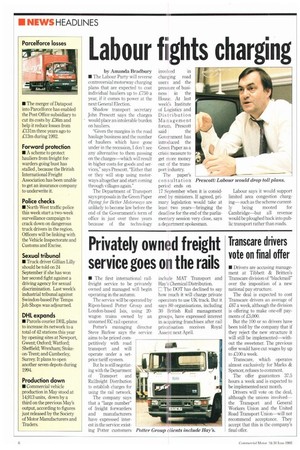Labour fights charging
Page 8

If you've noticed an error in this article please click here to report it so we can fix it.
by Amanda Bradbury • The Labour Party will reverse controversial motorway charging plans that are expected to cost individual hauliers up to £750 a year, if it comes to power at the next General Election.
Shadow transport secretary John Prescott says the charges would place an intolerable burden on hauliers.
"Given the margins in the road haulage business and the number of hauliers which have gone under in the recession, I don't see any alternative to them passing on the charges—which will result in higher costs for goods and services," says Prescott. "Either that or they will stop using motorways altogether and start coming through villages again."
The Department of Transport says proposals in the Green Paper Paying for Better Motorways are unlikely to become law before the end of the Government's term of office in just over three years because of the technology
involved in charging road users and the pressure of business in the House. At last week's Institute of Logistics and Distribution Management forum, Prescott said the Government has introduced the Green Paper as a crisis measure to get more money out of the transport industry.
The paper's consultation period ends on 17 September when it is considered by minister& lf agreed, primary legislation would take at least two years—bringing the deadline for the end of the parliamentary session very close, says a department spokesman. Labour says it would support limited area congestion charging—such as the scheme currently being mooted for Cambridge—but all revenue would be ploughed back into public transport rather than roads.
















































































